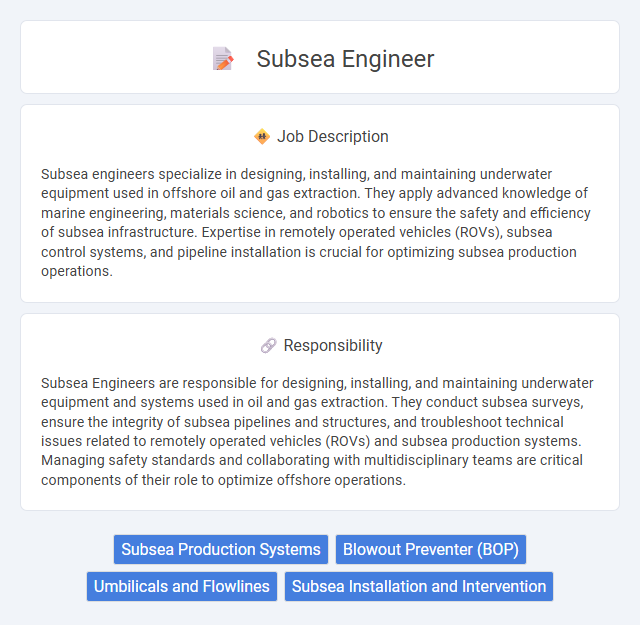
Subsea engineers specialize in designing, installing, and maintaining underwater equipment used in offshore oil and gas extraction. They apply advanced knowledge of marine engineering, materials science, and robotics to ensure the safety and efficiency of subsea infrastructure. Expertise in remotely operated vehicles (ROVs), subsea control systems, and pipeline installation is crucial for optimizing subsea production operations.
People with strong problem-solving skills and a background in engineering may likely find the role of a subsea engineer suitable due to the technical challenges and underwater environments involved. Those comfortable with working in isolated or physically demanding conditions might have a higher probability of success. Candidates who prefer routine or office-based tasks could potentially find the demanding and dynamic nature of subsea engineering less fitting.
Qualification
Subsea Engineers require a strong foundation in mechanical or marine engineering, typically holding a bachelor's degree in one of these disciplines. Proficiency in specialized software such as AutoCAD, SolidWorks, and finite element analysis tools is essential for designing and analyzing subsea equipment. Certifications like the Offshore Petroleum Safety and Environmental Management Systems (PSEMS) or certification in subsea inspection and integrity management enhance a candidate's qualifications and industry credibility.
Responsibility
Subsea Engineers are responsible for designing, installing, and maintaining underwater equipment and systems used in oil and gas extraction. They conduct subsea surveys, ensure the integrity of subsea pipelines and structures, and troubleshoot technical issues related to remotely operated vehicles (ROVs) and subsea production systems. Managing safety standards and collaborating with multidisciplinary teams are critical components of their role to optimize offshore operations.
Benefit
Subsea engineers likely enjoy competitive salaries due to the specialized skills required in underwater technology and offshore projects. The role probably offers opportunities for international travel and work in diverse marine environments, enhancing professional growth. Benefits may also include extensive training programs and access to advanced technological tools, supporting career advancement in the subsea industry.
Challenge
The role of a Subsea Engineer likely involves tackling complex technical challenges related to underwater infrastructure design and maintenance. Problem-solving in harsh, unpredictable marine environments may require innovative thinking and advanced engineering skills. Success in this position probably depends on adaptability and the ability to manage risks associated with deepwater operations.
Career Advancement
Subsea Engineers specializing in underwater equipment and pipeline systems can accelerate career advancement by gaining expertise in advanced subsea technologies such as ROVs and subsea control systems. Pursuing certifications like IMCA ROV Operator or Subsea Engineering Professional status enhances credentials and opens opportunities for senior engineering or project management roles. Experience in offshore projects combined with skills in software like AutoCAD and ANSYS drives progression into leadership and specialized technical positions within the oil and gas industry.
Key Terms
Subsea Production Systems
Subsea engineers specializing in Subsea Production Systems design, install, and maintain underwater equipment used in oil and gas extraction, including subsea trees, manifolds, and control systems. Expertise in hydraulic, electrical, and mechanical integration ensures efficient subsea flow assurance, reservoir management, and safety compliance. Advanced knowledge in remote-operated vehicles (ROVs) and subsea intervention technology is critical for optimizing production and minimizing environmental impact.
Blowout Preventer (BOP)
A Subsea Engineer specializing in Blowout Preventer (BOP) systems ensures the integrity and safety of offshore drilling operations by designing, installing, and maintaining complex pressure control equipment. Expertise in hydraulic and control systems is crucial for managing BOP functions, preventing uncontrolled fluid release, and minimizing environmental risks during well interventions. Proficiency in real-time monitoring technologies and compliance with industry standards like API 16D enhances operational reliability and mitigates blowout hazards.
Umbilicals and Flowlines
Subsea engineers specializing in umbilicals and flowlines design, install, and maintain critical subsea infrastructure that ensures efficient transport of fluids and control signals between offshore wells and surface facilities. They leverage advanced materials and technologies to optimize the durability and performance of umbilicals, which carry hydraulic fluids, electrical power, and communication signals, while ensuring flowlines maintain integrity under extreme subsea conditions. Expertise in dynamic analysis, corrosion protection, and trenching techniques is essential for preventing failures and maximizing production uptime in deepwater oil and gas fields.
Subsea Installation and Intervention
Subsea Engineers specializing in Subsea Installation and Intervention design, plan, and execute the deployment and maintenance of underwater oil and gas infrastructure, including pipelines, risers, and control systems. Their expertise includes remotely operated vehicles (ROVs), diving support, and advanced subsea tools to ensure safe and efficient underwater operations. Mastery of subsea construction techniques and intervention strategies is critical for optimizing asset life and minimizing operational risks in deepwater environments.
 kuljobs.com
kuljobs.com